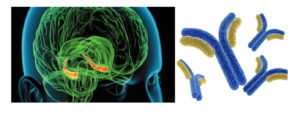In the current issue of JNNP, Vanli-Yavuz and colleagues published the largest systematic screening study of neuronal autoantibodies in mesial temporal lobe epilepsy with hippocampal sclerosis (MTLE-HS). Of relevance to the study, epilepsy is a prevalent neurological disorder affecting over 50 million people worldwide. Despite all the advances in this field, it is estimated that around 30% of all patients with epilepsy are refractory to antiepileptic treatment, MTLE-HS being one of the major causes of intractable epilepsy. Different mechanisms have been related to the development of this disease including a possible autoimmune dysfunction among others.
Returning to the study by Vanli-Yavuz and colleagues, the authors studied the prevalence of different neuronal autoantibodies in a large series of 111 patients with MTLE-HS and compared with 80 control subjects (30 healthy subjects and 50 patient with relapsing-remitting multiple sclerosis) (http://jnnp.bmj.com/content/87/7/684.full). Interestingly, they found the presence of neuronal autoantibodies in 22.5% of MTLE-HS patients principally against the VGKC-complex. The healthy and disease control group did not show any neuronal autoantibodies. The presence of neuronal autoantibodies was associated with a history of status epilepticus, diagnosis of psychosis, and involvement of temporal and extra-temporal regions on PET/SPECT studies. In addition, specifically, the VGKC-complex patient’s subgroup also was associated with cognitive dysfunction. Surprisingly, unexplained remission (either spontaneous or following antiepileptic drugs) was significantly more frequent in the seropositive group (28% vs 3.5%). Finally, the authors reported the absence of inflammatory activity in brain tissue from 7 operated seropositive patients.

Given the prevalence and the complex treatment approaches to MTLE-HS, the findings in this article seem highly relevant in the future consideration of immunomodulatory therapies in these patients. However, before this can happen, there are still many questions that need to be critically addressed. For instance, What is the role of these neuronal autoantibodies in MTLE-HS pathogenesis? Are they pathogenic or are they the consequence of neuronal destruction? Why are these neuronal autoantibodies associated with patients with unexplained remission?. Clearly, further studies will be needed to answer some of these questions. Nevertheless, this study provides hope to improve our understanding of this disease and suggest a new skyline for this neurological disease.
Well worth the read!!